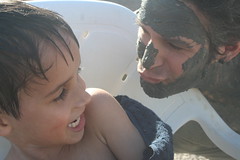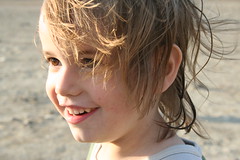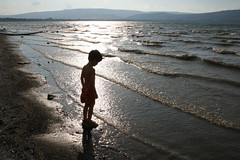 Continuing my hair theme: The other day I saw a really strong mullet. This was a young Arab guy. It was classic, a sort of jerry-curled billy-ray cyrus thing. The guy sporting it looked pretty tough and even if I had had a camera there was no way I was going to snap his picture. I have only seen two mullets here in Israel. The other one was a few months ago and on a Russian-looking guy. What's Russia- looking? Well it was old-style Russian, like the guys I knew twenty years ago when I was on kibbutz. He was wearing a lot of acid-washed denim for one thing. He was blond and pale and he had a whispy blond moustache which completes the mullet well.
Continuing my hair theme: The other day I saw a really strong mullet. This was a young Arab guy. It was classic, a sort of jerry-curled billy-ray cyrus thing. The guy sporting it looked pretty tough and even if I had had a camera there was no way I was going to snap his picture. I have only seen two mullets here in Israel. The other one was a few months ago and on a Russian-looking guy. What's Russia- looking? Well it was old-style Russian, like the guys I knew twenty years ago when I was on kibbutz. He was wearing a lot of acid-washed denim for one thing. He was blond and pale and he had a whispy blond moustache which completes the mullet well.Israel is a society of short hair and long hair. Israel likes dualisms, clear dichotomies. Arab/Jew Secular/Religious, Sabra/Immigrant short hair/long hair. Short hair says neat, organized, tough and military. Long hair says hippy, rebel, soft, hiding. Those are the choices and guys go with them. Arab guys, too, while sporting lots of styles are not really adventurous; they adhere to the two basic styles rule, long or short. Mullets blow up dichotomies like that. They are anti-hippie, small-town, conservative but rebellion. Business up front, party at the back. At least that's what I always see when I see a mullet (at least on a guy). Debbie's friend Matt Bissonnette's book Smash Your Head on the Punk Rock has a classic mullet scene when some anglo kids go on an exchange trip up in Point-au-pique and meet a French Canadian guy who is like the coolest thing in his small town and the narrator calls him "the lord, high King Pepper". It is a pretty funny scene in a funny book. The narrator ends up getting worked over by the lord, high King Pepper for messing with his girlfriend.
It is noteworthy that both the mullets I have seen were solitary. I think of the mullet as needing at least one mullet-follower, somebody sporting a less committed mullet, a mullet fellow-traveller. It must be lonely wearing a mullet here.
The guy I saw this week had seriously luxurious looking curls in back, and some wet-look product on. In addition to making me think of Absalom, who I had on the brain anyway, it reminded me of a theme in the Illiad -- the ultimate West versus East book --- about the Trojans and their curled and scented hair, how the Greeks disdain them for it. But, of course, Paris woos away Helen with that hair. I'll have to ask David -- a classicist -- about it when I see him this weekend if he remembers what I'm talking about. My guess is the Trojans had the pretty-boy long hair, the Greeks had the short hair. Not a lot of room for in-between or stylistic equivocation when you are on the battlefront of the clash of civilizations.

























